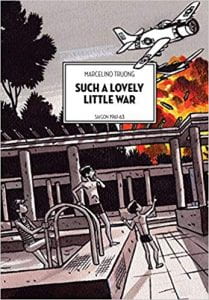 One of the joys of being a school librarian is chatting to staff and students about books and hearing their latest recommendations. I was particularly happy to find out that one of our Y11 girls had discovered the wonders of graphic novels to support her History GCSE course. She was eagerly broadening her knowledge of the history topics in the course in a quick and accessible way. The book which started this process was Marcelino Truong’s biographical graphic novel set in Vietnam ‘Such a lovely little War: Saigon 1961 – 1963’ and the sequel ‘Saigon Calling: London 1963-75’. This beautiful, gripping graphic memoir tells the story of Marco, the son of a Vietnamese diplomat and a his French wife, during the early years of the Vietnam War. They are visually stunning books and emotionally involving as the reader learns of the details of family life as well as the impact and events of the war closing in.
One of the joys of being a school librarian is chatting to staff and students about books and hearing their latest recommendations. I was particularly happy to find out that one of our Y11 girls had discovered the wonders of graphic novels to support her History GCSE course. She was eagerly broadening her knowledge of the history topics in the course in a quick and accessible way. The book which started this process was Marcelino Truong’s biographical graphic novel set in Vietnam ‘Such a lovely little War: Saigon 1961 – 1963’ and the sequel ‘Saigon Calling: London 1963-75’. This beautiful, gripping graphic memoir tells the story of Marco, the son of a Vietnamese diplomat and a his French wife, during the early years of the Vietnam War. They are visually stunning books and emotionally involving as the reader learns of the details of family life as well as the impact and events of the war closing in.
We’ve built up a diverse collection of graphic novels and particularly focused on historical events and biographies.
Here are a few suggestions:
March (3 Books) by John Lewis, Andrew Aydin and Nate Powell. ‘With March, Congressman John Lewis takes us behind the scenes of some of the most pivotal moments of the Civil Rights Movement. In graphic novel form, his first-hand account makes thiese historic events both accessible and relevant to an entire new generation… LeVar Burton
Maus (Book l and ll) by Art Spiegelman. Pulitzer prize-winning graphic novel – the moving narrative of the Holocaust portraying Spiegelman’s father’s experiences of the Holocaust.
The Arab of the Future by Riad Sattouf ( 3 books) This is a graphic memoir of a childhood in the Middle East, 1978 – 1984, Book 2 1984-1985 and Book 3 1985 – 1987). Riad Sattouf is a bestselling cartoonist who grew up in Syria and Libya. These books are funny, sad and brilliantly observed.
Persepolis by Marjane Satrapi ‘The intelligent and outspoken child of radical Marxists, and the great-grandaughter of Iran’s last emperor, Satrapi bears witness to a childhood uniquely entwined with the history of her country. Persepolis paints an unforgettable portrait of daily life in Iran and of the bewildering contradictions between home life and public life. This is a beautiful and intimate story full of tragedy and humour – raw, honest and incredibly illuminating.’
How to understand Israel in 60 days of less by Sarah Glidden
Malcolm X a graphic biography by Andrew Helfer and Randy DuBurke
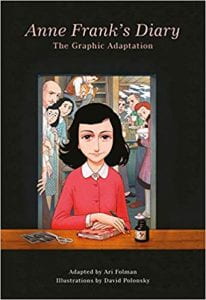 Anne Frank’s Diary: The Graphic Adaptation by David Polonsky Published in 2018 this is the first graphic adaptation of Anne Frank’s Diary.
Anne Frank’s Diary: The Graphic Adaptation by David Polonsky Published in 2018 this is the first graphic adaptation of Anne Frank’s Diary.
Trinity : a graphic history of the first atomic bomb : graphic novel by Jonathan Fetter-Vorm
Nat Turner : graphic novel by Kyle Baker
Safe area Gorazde : the war in Eastern Bosnia, 1992-95 : graphic novel by Joe Sacco
Gettysburg – the graphic novel written and illustrated by C.M. Butler
Little White Duck – A Childhood in China by Na Liu and Andres Vera Martinez
Marzi – A memoir by Marzena Sowa. Told from a young gir’s viewpoint ‘Marzi’ is a coming-of-age story which portrays the tough life behind the Iron Curtain whilst exploring the daily life of an ordinary girl in turbulent times.
The Battle of the Bulge by Wayne Vansant. A graphic history of the Allied victory in teh Adrenne, 1944 – 1945.
Che: A graphic biography by Spain Rodriguez.
Line of Fire: Diary of an unknown soldier by Barroux. Introduced by Michael Morpurgo
Trotsky: A graphic biography by Rick Geary
Barefoot Gen Volume 1 A Cartoon Story of Hiroshima by Keiji Nakazawa
Barefoot Gen – The Day After Volume ll by Keiji Nakazawa
The Last day in Vietnam by Will Eisner. This fictional memoir, drew on Eisner’s time in Korea and Vietnam involved with military service.
Castro – A graphic novel by Reinhard Kleist
Don’t forget we also have a recently established collection of Historical Fiction in the History Department to provide another source of enjoyable and informative history themed reading.
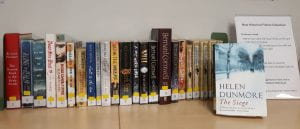 We have other non-fiction graphic novels too:
We have other non-fiction graphic novels too:
Economics:
- Economix – How our Economy works (and doesn’t work) in words and pictures by Michael Goodwin, illustrated by Dan E. Burr
Art:
- Basquiat – Script by Julian Voloj, illustrations by Soren Mosdal
Science:
- Radioactive – Marie & Pierre Curie: A tale of love and fallout by Lauren Redniss.
- Feynman by Ottaviani & Myrick
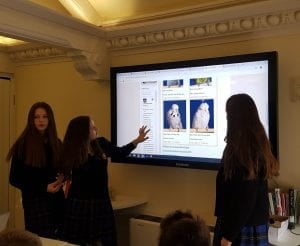
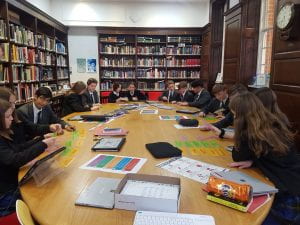
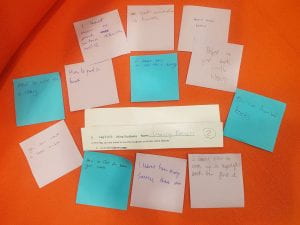
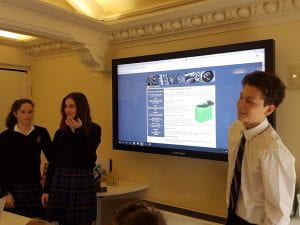
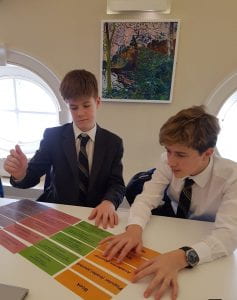 nks to the librarians at Middlesex University for sharing this excellent idea. They have developed a wide range of hands-on activities which form useful bases for discussion and group work. All their resources are found here:
nks to the librarians at Middlesex University for sharing this excellent idea. They have developed a wide range of hands-on activities which form useful bases for discussion and group work. All their resources are found here: